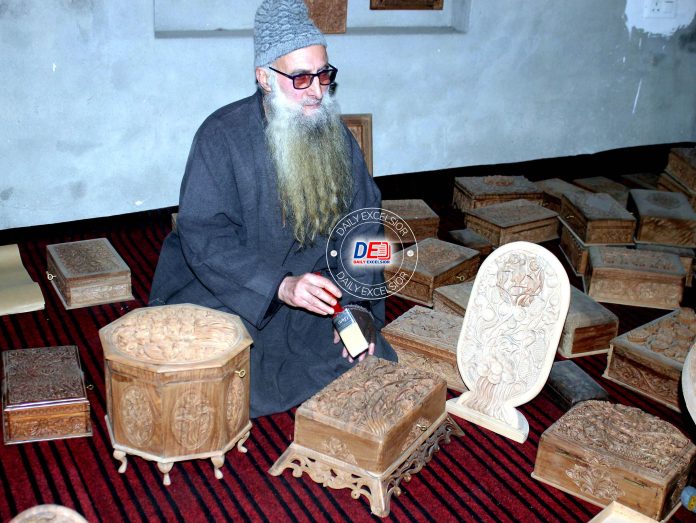
SRINAGAR, Jan 27: Ghulam Nabi Dar, a 72-year-old master craftsman from Srinagar honoured with the Padma Shri for his contribution to wood carving, feels government recognition and support are very important in preserving traditional arts.
His unwavering dedication to his craft for over six decades has earned him numerous accolades, culminating in this national recognition announced on the eve of the country’s 75th Republic Day.
Many feel the award to Dar will serve as a catalyst for the revival of the craft steeped in the history of Kashmir and a testament to the resilience of traditions that have withstood the test of time.
In an interview to PTI video Friday, Dar spoke about his arduous journey.
Born into adversity, Dar was introduced to a wood carving unit at a young age. Despite initial rejections from craftsmen unwilling to teach the trade, his perseverance eventually led him to a mentor Nooruddin Tikoo, who imparted his knowledge through intricate designs on paper.
“I was 10 years old when my father suffered losses in his business and was broke. As he could not pay the fees, I was expelled from school. My maternal uncle took me and my younger brother to a wood carving unit at Sarai Safakadal so that we could learn the craft,” Dar, who lives in Sekidafar area of old Srinagar city, said.
Although the master craftsman said he did not learn much during the five years at the wood carving unit, the stay there, however, aroused his interest in the art and he decided that he will learn it to earn his livelihood.
“I faced a lot of difficulties in learning this art. I went to several craftsmen but they turned me away saying I won’t be able to learn… But I was determined and worked hard. And I am thankful to the almighty for it,” he added.
“However, Tikoo had suffered a stroke and his right hand was paralysed. When he heard my story, he said he will still teach me through designs made on paper. I followed his instructions and he taught me this art,” Dar said.
Dar’s artistic prowess flourished as he transitioned from traditional designs to creating his own unique works inspired by nature. His talent was recognised when he received a state award in 1984, and later, an opportunity to work in Baghdad in the early 1990s. His craftsmanship reached new heights when he was honoured with the National Award in 1995-96.
Dar and his family are happy for all the recognition his work has fetched.
“I am very happy, my family is also very happy… When a craftsman gets an award, any award, he gets encouragement. He tries to go further in the field. If the government does not encourage the artisans, they lose interest,” he said.
Expressing gratitude for the recognition, Dar emphasised the importance of government support in preserving traditional arts. He urged the establishment of a comprehensive institution or workshop to train and incentivise young artisans, safeguarding the future of wood carving.
With his son following in his footsteps, Dar remains hopeful for the continuity of his craft, stressing the need for sustained interest and support from both the government and the public.

